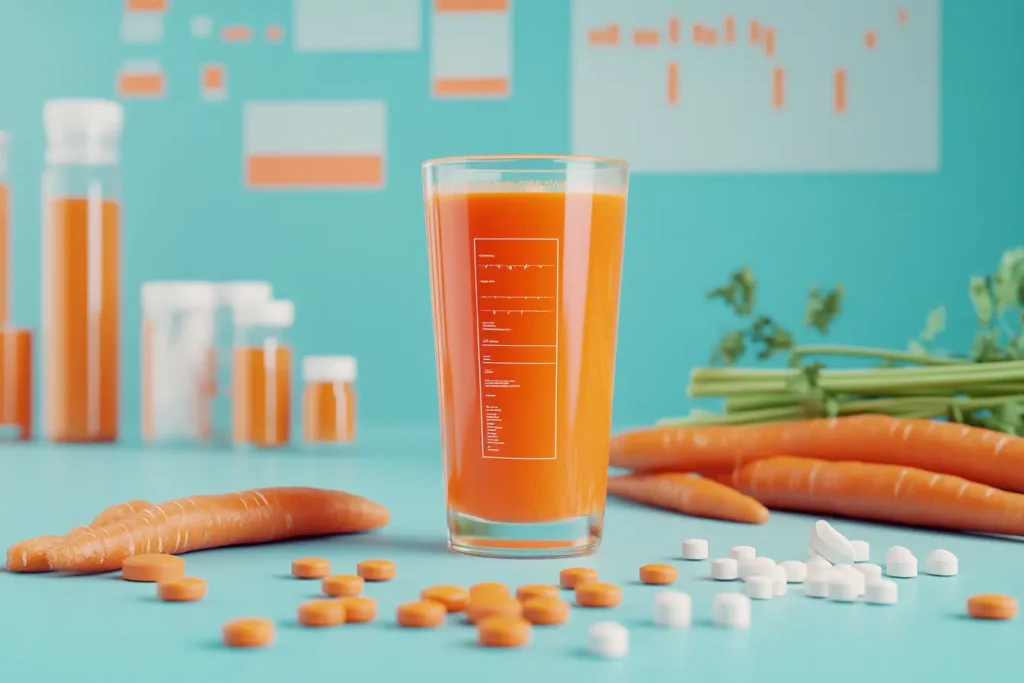Carrot juice has long been celebrated for its vibrant hue and exceptional health benefits. This nutrient-packed beverage is a favorite among health-conscious individuals seeking to improve their overall well-being. But a pressing question arises: is it OK to drink carrot juice every day?
Studies indicate that daily carrot juice consumption can enhance total antioxidant status and reduce lipid peroxidation, two critical markers for combating oxidative stress and promoting cellular health. However, these benefits depend on moderation and individual health circumstances. Throughout this article, we’ll explore the nutritional profile of carrot juice, its numerous health benefits, potential risks, and safe ways to incorporate it into your daily routine.
For breakfast inspiration, explore how vegan soup dumplings incorporate plant-based ingredients for a flavorful twist or learn about the hearty and nutritious swamp soup, perfect as a base for vegetable dumplings.
Table of Contents
Nutritional Profile of Carrot Juice
Carrot juice boasts an impressive array of nutrients, making it a standout choice for health enthusiasts. Rich in vitamins, minerals, and antioxidants, it serves as a convenient way to boost your daily nutrient intake.

Key Nutrients Found in Carrot Juice
One of the most remarkable aspects of carrot juice is its high beta-carotene content. Beta-carotene, a precursor to vitamin A, supports eye health, skin vitality, and immune function. An 8-ounce glass of carrot juice provides up to 800% of the recommended daily intake of vitamin A. This potent nutrient aids in reducing oxidative stress and improving vision.
Moreover, carrot juice contains vitamin C, an antioxidant that strengthens the immune system and promotes collagen production. Other vital nutrients include vitamin K, which supports bone health, and vitamin B6, which aids in brain function and energy metabolism. Potassium in carrot juice helps regulate blood pressure, while manganese contributes to antioxidant enzyme activity.
Calories, Sugar, and Fiber Content
Despite its rich nutrient profile, carrot juice is relatively low in calories, containing approximately 80–94 calories per 8-ounce serving. However, its natural sugar content warrants attention, especially for individuals managing blood sugar levels. Carrot juice also contains minimal fiber compared to whole carrots, making it less effective for promoting satiety.
Fresh vs. Pasteurized Carrot Juice
Fresh carrot juice retains more nutrients and antioxidants compared to pasteurized versions. However, pasteurized juices are safer for pregnant individuals, children, and those with weakened immune systems. When possible, opt for fresh, homemade juice for maximum benefits.
Health Benefits of Drinking Carrot Juice Daily

Boosts Antioxidant Levels
Carrot juice is renowned for its potent antioxidant properties, primarily attributed to beta-carotene, lutein, and zeaxanthin. These compounds combat free radicals, which are unstable molecules that can damage cells and accelerate aging. Research shows that consuming carrot juice daily can significantly increase plasma antioxidant capacity, helping to neutralize oxidative stress.
In addition, carrot juice reduces lipid peroxidation, a process where free radicals damage lipids, leading to cellular dysfunction. Lipid peroxidation is linked to various chronic conditions, including cardiovascular disease and neurodegenerative disorders. By enhancing total antioxidant status, carrot juice supports overall cellular health, making it an excellent addition to a balanced diet.
Supports Heart Health
Carrot juice promotes cardiovascular health through its potassium and antioxidant content. Potassium plays a critical role in maintaining healthy blood pressure levels by balancing sodium in the body. Regular consumption of carrot juice may help reduce systolic blood pressure, contributing to a lower risk of heart disease.
Additionally, antioxidants in carrot juice prevent the oxidation of LDL cholesterol, a key factor in the development of atherosclerosis. Although carrot juice alone cannot lower cholesterol or triglyceride levels without other dietary changes, its ability to reduce oxidative stress indirectly supports heart health.
Enhances Eye Health
The link between carrot juice and improved vision is well-established, largely due to its high beta-carotene content. Beta-carotene is converted into vitamin A, a nutrient essential for maintaining the retina’s function and preventing night blindness.
Lutein and zeaxanthin, two additional antioxidants found in carrot juice, protect the eyes by filtering harmful blue light and reducing the risk of age-related macular degeneration (AMD) and cataracts. Regular consumption of carrot juice can help safeguard your vision and maintain eye health as you age.
Improves Skin Health
Carrot juice offers numerous benefits for the skin, making it a popular choice among those seeking a radiant complexion. Its high beta-carotene content supports collagen production, which is essential for maintaining skin elasticity and reducing the appearance of wrinkles.
Vitamin C in carrot juice promotes hydration and aids in repairing damaged skin cells. Furthermore, the antioxidants in carrot juice combat inflammation, reducing redness and acne. Drinking carrot juice daily can leave your skin looking refreshed, hydrated, and glowing.
Potential Risks of Daily Carrot Juice Consumption
Carotenemia and Vitamin A Toxicity
While carrot juice is undoubtedly nutritious, excessive consumption can lead to carotenemia, a harmless condition where the skin develops a yellowish-orange tint due to elevated beta-carotene levels. Although this condition is temporary and resolves with reduced intake, it underscores the importance of moderation.
Vitamin A toxicity, on the other hand, is more serious. Consuming excessive amounts of vitamin A from supplements or carrot juice can cause symptoms such as nausea, dizziness, and, in severe cases, liver damage. To avoid these risks, limit your daily intake to 4–8 ounces.
Impact on Blood Sugar Levels
Carrot juice’s natural sugar content can cause blood sugar spikes, particularly when consumed in large quantities or without fiber. For individuals with diabetes or insulin resistance, it’s essential to monitor portion sizes and pair carrot juice with protein or healthy fats to stabilize glucose levels.
Tips for Safe Carrot Juice Consumption
How Much Carrot Juice is Safe?
To reap the benefits of carrot juice without experiencing adverse effects, limit your intake to one 8-ounce glass per day. This amount provides ample nutrients while minimizing the risk of carotenemia or vitamin A toxicity.
For individuals with specific health conditions, such as diabetes or high blood pressure, consult a healthcare professional to determine the appropriate amount.
Fresh vs. Pasteurized Carrot Juice
While fresh carrot juice is richer in nutrients, pasteurized versions are safer for vulnerable populations. If you opt for fresh juice, ensure it is consumed immediately after preparation to retain its nutritional value and reduce the risk of contamination.
Incorporating Carrot Juice into Your Diet
Best Time to Drink Carrot Juice
The timing of your carrot juice consumption can influence its benefits. Drinking carrot juice on an empty stomach in the morning enhances nutrient absorption, making it an ideal start to your day. Alternatively, consuming it alongside a meal can help regulate blood sugar levels and provide a balanced energy boost.
Creative Recipe Ideas
- Carrot-Ginger Juice: Blend fresh carrots with ginger for a spicy, anti-inflammatory drink.
- Carrot-Orange Juice: Add a splash of freshly squeezed orange juice for a vitamin C boost.
- Carrot Smoothie: Mix carrot juice with yogurt, spinach, and a banana for a nutrient-dense breakfast option.
Carrot juice pairs well with breakfast dishes like vegan soup dumplings and hearty swamp soup. Experiment with different flavors to keep your mornings exciting and nutritious.
Conclusion
Carrot juice is a nutrient-dense beverage with numerous health benefits, including improved antioxidant status, reduced lipid peroxidation, and enhanced heart, eye, and skin health. However, moderation is key to avoiding potential risks like carotenemia and vitamin A toxicity.
Incorporating carrot juice into your daily routine can be as simple as enjoying an 8-ounce glass in the morning or pairing it with your favorite breakfast dishes. With its rich flavor and impressive nutrient profile, carrot juice is a versatile addition to a healthy lifestyle.
Looking for more ways to incorporate nutritious ingredients into your meals? Discover how rice paper dumplings can be adapted for vegetable fillings and soup bases.
FAQs
How Much Carrot Juice Should I Drink a Day?
The question, is it OK to drink carrot juice every day?, often leads to discussions about gut health. Carrot juice supports digestion and hydration, but it doesn’t literally “clean” your gut. Instead, its nutrients like vitamin A and antioxidants promote digestive wellness. However, carrot juice lacks the fiber of whole carrots, so incorporating raw carrots or other high-fiber foods into your diet alongside carrot juice can enhance gut health even further.
Can Too Much Carrot Juice Be Bad?
Yes, drinking too much carrot juice can have negative effects. Overconsumption may lead to:
Carotenemia: A temporary discoloration of the skin caused by excessive beta-carotene.
Vitamin A Toxicity: High levels of vitamin A over time can cause symptoms such as nausea, dizziness, and even liver damage in severe cases.
Blood Sugar Spikes: Carrot juice is lower in fiber than whole carrots, which can lead to rapid sugar absorption and affect blood sugar levels.
Stick to a moderate intake of carrot juice to avoid these risks while enjoying its health benefits.
Is Carrot Juice Full of Sugar?
Carrot juice contains natural sugars, with about 9 grams per 8-ounce serving. While these sugars are naturally occurring and paired with beneficial nutrients like vitamins and antioxidants, they can still impact blood sugar levels if consumed in large quantities. This is particularly important for individuals with diabetes or insulin resistance. Pairing carrot juice with protein or fiber-rich foods can help slow sugar absorption and maintain steady blood sugar levels.
Does Carrot Juice Clean Your Gut?
Carrot juice may support gut health, but it doesn’t “clean” your gut in the literal sense. Its nutrients, such as antioxidants and vitamin A, contribute to overall digestive health.

